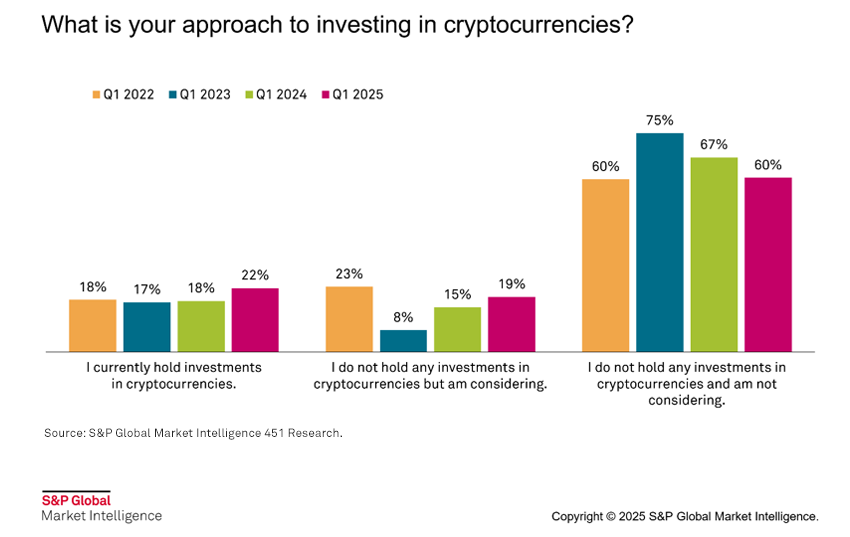
Source: NiseriN/iStock/Getty images.
After a couple of rocky years, more investors seem ready to give cryptocurrency another chance. Our survey shows renewed confidence in crypto as a viable investment vehicle, though it is important to note that, overall, investors are still fairly divided. Traditional investment vehicles, such as stocks and ETFs, continue to stand out as the top choices among self-directed investors. Bitcoin and Ethereum are the most popular cryptocurrency platforms, while Charles Schwab remains the most used investing platform.
A recent survey conducted by S&P Global Market Intelligence 451 Research with self-directed investors focuses on the most popular types of investments and platforms, including the outlook for cryptocurrencies. The survey also looks at top credit card perks and overall usage trends.
Consumer Investing Trends
Investors show renewed interest in cryptocurrency. Interest in cryptocurrencies is showing the first real pop since we began surveying on the topic in 2022. The results show 22% of investors holding investments in cryptocurrencies, up 4 points compared with our 2024 survey. Additionally, 19% say they don’t currently hold crypto investments, but are considering, also up compared with last year. While a majority of respondents (60%) still show no interest in crypto, the year-over-year improvement is a positive sign that investors may be ready to move past the FTX debacle from a couple years ago. This is also reflected in the overall sentiment toward the utility of crypto, where the survey shows a 9-point total improvement in the number of respondents who see cryptocurrency as the future (7%) or are cautiously optimistic (39%).

Bitcoin and Ethereum remain the most popular cryptocurrencies. Bitcoin (75%) and ether (60%) remain the most-owned cryptocurrencies by respondents. They are far ahead of the next-closest coins, Solana sols (27%) and Cardano adas (18%), due at least in part to the much larger market caps the two leaders enjoy over the other cryptocurrencies.
Investors remain divided on the viability of cryptocurrency. Despite the improved level of confidence, cryptocurrency as an investment vehicle still has somewhat of a bad reputation Among respondents who do not invest in cryptocurrencies, most (59%) say they do not trust it and 44% say prices are too unstable. Among respondents who do invest in cryptocurrencies, 68% say it is to diversify their portfolios and 58% say it is a good general investment to grow wealth.
Stocks and ETFs remain the primary investment vehicles. Similar to previous years, 75% of respondents say stocks and ETFs are the asset types that make up the biggest chunk of their self-directed investing portfolios. This is more than double the allocations for mutual funds (37%), options and futures (24%), and bonds (23%). Cryptocurrency (15%) is the only other investment vehicle in double digits, but it remains well behind the others.
Charles Schwab is the most used investment platform. The Charles Schwab/TD Ameritrade brand continues to be used by more than half of self-directed investing survey respondents (52% use mobile app; 50% use website). Fidelity, used by one-third of respondents across its mobile app (34%) and website (34%), comes in a strong second. Another 18% use the combined E*TRADE and Morgan Stanley brands’ mobile apps, and 16% using their websites. These results are largely in-line with previous surveys, highlighting how little churn there is among the top consumer investment firms.
Mobile investing apps are underutilized. Self-directed investors with the highest discretionary income remain the most hesitant to fully embrace mobile apps. Only 34% of respondents say they currently use mobile devices for investment-related activities, unchanged from last year’s survey. When asked why they don’t use mobile apps for investing, the top reason cited is the user experience (46%), followed by the fact that they simply have no need (35%) and their security concerns (33%). These feelings are supported by the fact that customer satisfaction with investment websites is higher than for mobile apps.
Credit Card Usage
Travel perks still resonate most with consumers. Among respondents who hold at least one credit card with an annual fee (53% of respondents), travel perks remain the most important features. Specifically, travel-related perks like airport lounge access, elite memberships and frequent flier programs are enjoyed by 46% of this group. This is followed closely by enhanced travel protections (42%) such as trip insurance, rental coverage and roadside assistance. These perks are noticeably more popular than the next tier of features, which includes credit toward subscriptions or fees (24%), annual airline companion fares (21%) or relaxed spending limits (21%). However, 71% of consumers point out that they would cancel a card if the annual fee amount went up, and 62% would do so if benefits were reduced.
Cash remains king. Looking more broadly at users of credit cards without an annual fee (96% of respondents), cash-back rewards on all purchases (51%) remains the most important feature along with no annual fee (51%). Fraud protection (37%) is also highly valued, as are cash-back rewards on specific spending categories (24%). The focus on cash back and low fees is a factor in why almost half (47%) of consumers stay away from credit cards with annual fees. Mainly they are satisfied with no-fee cards (56%), and the extra benefits are not enough to justify the cost (33%). Meanwhile, Chase (18%), Citi (14%) and American Express (11%) are the most used among the big credit card providers by respondents.ore detail this year, looking at specific technology and service providers and their offerings, given that we expect this trend to be one of the most significant shaping SecOps tech in 2025.
Want insights on fintech trends delivered to your inbox? Join the 451 Alliance.

